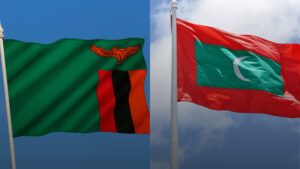Maldives and Zambia Join the Open Government Partnership
New York – The Governments of Maldives and Zambia have formally declared their intention to join the Open Government Partnership (OGP), a global partnership of more than 75 countries and 150 local jurisdictions working with thousands of civil society organizations to build more open, inclusive, and accountable governments.
This announcement was made during a ministerial roundtable on the sidelines of the 79th United Nations General Assembly, marking an important milestone in the ongoing global effort to strengthen open government in Africa and Asia.
“As a nation committed to fostering transparency, accountability, and civil society engagement, the Maldives believes that participating in OGP will significantly enhance its governance practices and contribute to the well-being of its citizens”, said Ibrahim Thoriq, Minister of Climate Change, Environment and Energy of the Maldives.
The country committed to joining OGP at the inaugural Summit for Democracy in December 2021 and has taken important steps to advance open government. Minister Thoriq underscored the efforts taken by the Government to nurture an independent civil society, ensure equal access to justice for all citizens, empower youth, and prioritizing and encouraging active participation of women in the decision-making process.
Likewise, the Government of Zambia noted that joining OGP represents a unique opportunity to build on existing reforms aimed at enhancing transparency and accountability. By joining OGP, Zambia is poised to further strengthen its anti-corruption efforts, improve the efficiency of public services, and foster greater citizen participation in the decision-making process.
“Zambia is inspired and eager to be part of this great Partnership and movement of reformers, who are working towards building governments that are open, inclusive, corruption free and operate with integrity,” shared officials representing the Minister of Justice of Zambia, Princess Kasune.
“We most warmly welcome Maldives and Zambia to OGP, adding strong momentum to our open government movement globally,” said OGP CEO Sanjay Pradhan. “By joining OGP, they are taking a significant step towards making their governments more participatory, responsive and accountable to their citizens. We look forward to supporting them in this important journey.”
With the addition of Zambia and the Maldives, OGP is now composed of more than 75 countries, bringing together governments and civil society organizations to co-create solutions that tackle some of the world’s most pressing challenges.
Both countries will now begin the process of developing their first OGP action plans, which will outline specific commitments to advance open government in their respective contexts. In 2025, both countries will reconvene with other open government leaders in Spain for the OGP Global Summit in 2025.
For press queries or more information, please contact jose.perez@opengovpartnership.org.
ABOUT OGP:
The Open Government Partnership (OGP) is a unique global initiative that brings together governments and civil society to drive concrete commitments aimed at promoting transparency, increasing public participation, combating corruption, and leveraging technology to make governments more open, effective, and accountable to citizens worldwide.
Launched on September 20, 2011, during the UN General Assembly, OGP began with eight heads of state and an equal number of civil society leaders endorsing the Open Government Declaration and unveiling the first set of action plans, each containing specific commitments to advance open government reforms. Since then, OGP has expanded to 75 countries, 150 local governments, and thousands of civil society organizations. OGP’s Independent Reporting Mechanism ensures accountability by providing comprehensive, impartial reports that assess government progress on these commitments.


Thirusha Reply
Should Open Government also include Open Access to public information? Particularly, public legal information. Love to discuss this further, in line with the Free Access to Law Movement objectives.